|
| |
|
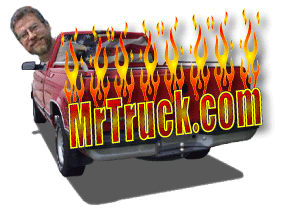
|
TruckAnswers.com
"Your Pickup
Truck, SUV & Trailer Library."
Diesels, transmissions,
axle ratio's, duals, beds
|
|
 My
300,000 mile "77" Chevy truck with wool bags loaded on my 16
foot triple axle flatbed before I stretched it to 33'. "It's
been lengthened a few too many times," flatbed with triple axle
trailer house axles. Only 2 engines, 2 transmissions, 2
differentials, 50 alternators and starters. Farm trucks haul
everything and and have to to pay for themselves. My
300,000 mile "77" Chevy truck with wool bags loaded on my 16
foot triple axle flatbed before I stretched it to 33'. "It's
been lengthened a few too many times," flatbed with triple axle
trailer house axles. Only 2 engines, 2 transmissions, 2
differentials, 50 alternators and starters. Farm trucks haul
everything and and have to to pay for themselves.
|
|
Diesels
are Different
Diesels have generally twice the compression of a gas engine and
require compression and heat to explode diesel fuel. This
requires diesel engines to be built heavier than gas engines
that use spark to ignite gasoline. The exploding diesel is one
of the reasons diesel engines are louder. High compression in a
diesel creates the heat needed for combustion but for fast
starting truck manufactures heat the fuel and air going into the
engine. Ford Power Stroke uses glow plugs in each cylinder;
GM Duramax diesel has glow plugs and an intake manifold heater.
Dodge Cummins diesel has an intake manifold heater to help start
the engine.
Glow
plugs warm up the cylinders before the fuel gets there
and a manifold heater warms the air going into the engine.
The rest of the story,
Click...
|
|
Diesels need the
water drained from fuel filters monthly in the winter.
|
 GM Duramax diesel fuel filter. Primer pump on
top water drain on bottom which you twist like a wing nut for
LB7 engine. LLY and LBZ are auto prime. GM Duramax diesel fuel filter. Primer pump on
top water drain on bottom which you twist like a wing nut for
LB7 engine. LLY and LBZ are auto prime. |
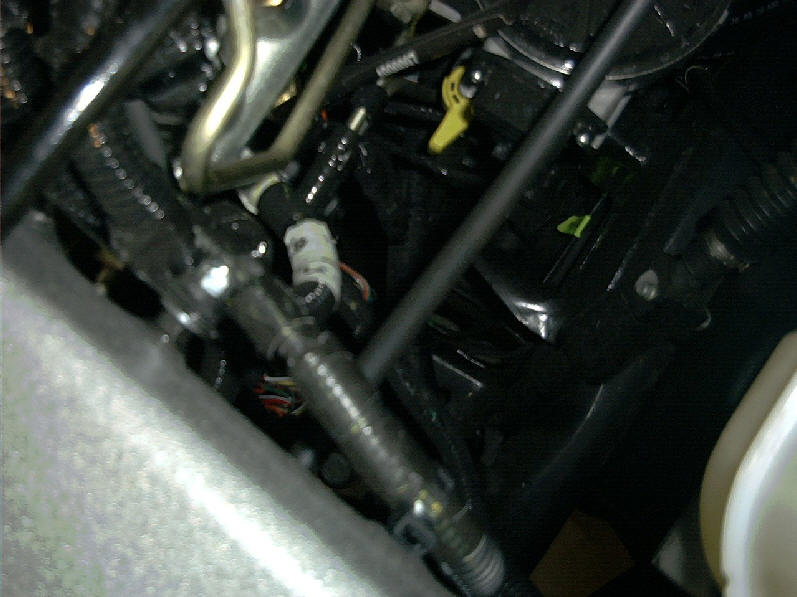 Dodge Cummins fuel filter. Yellow valve at the
bottom of the fuel filter is the water drain. Dodge Cummins fuel filter. Yellow valve at the
bottom of the fuel filter is the water drain. |
 Ford 7.3L Power Stroke fuel filter has the
yellow water drain on the right. Ford 7.3L Power Stroke fuel filter has the
yellow water drain on the right. |
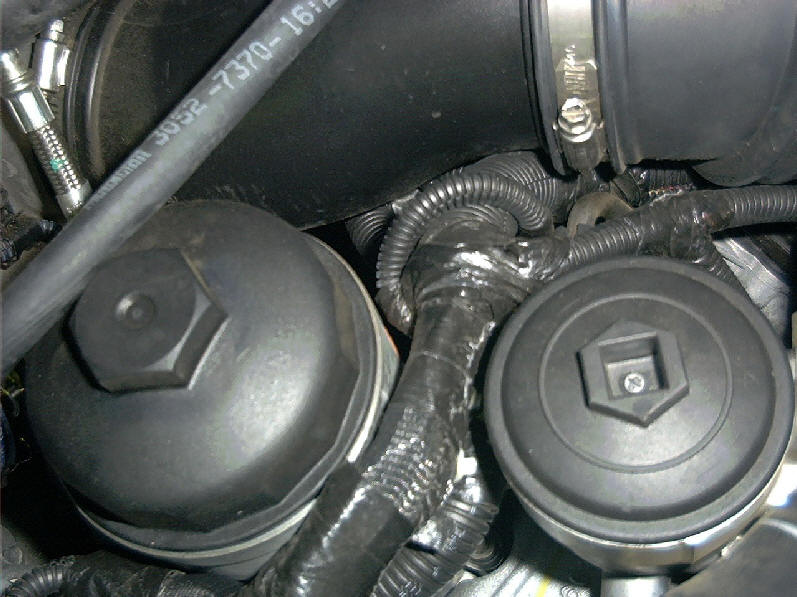 Ford 6.0L Power
Stroke oil and fuel filter on top the engine. Second fuel filter
in frame rail by tranny on drivers side. Both filters need
changed at the same time. The water drain is on the lower filter
inside the frame rail. On 7.3L Power Stoke, the fuel filter on
top of the engine has a drain lever on the side or back
depending on year to drain. Ford 6.0L Power
Stroke oil and fuel filter on top the engine. Second fuel filter
in frame rail by tranny on drivers side. Both filters need
changed at the same time. The water drain is on the lower filter
inside the frame rail. On 7.3L Power Stoke, the fuel filter on
top of the engine has a drain lever on the side or back
depending on year to drain. |
 Fuel filter # 2 on the Ford 6.0L
Power Stroke. This one's on the drivers side inside frame across
from the transmission. With a hex water drain plug. From what
I've heard both filters need changed together. Ford is
considering a valve on the lower fuel filter which it had on the
old Power Stroke filter on top. Fuel filters need changed often,
especially in winter. Fuel filter # 2 on the Ford 6.0L
Power Stroke. This one's on the drivers side inside frame across
from the transmission. With a hex water drain plug. From what
I've heard both filters need changed together. Ford is
considering a valve on the lower fuel filter which it had on the
old Power Stroke filter on top. Fuel filters need changed often,
especially in winter. |
How
would you like a safer, better handling truck on rutted dirt
roads and pothole pavement? And have no risk to try it out?
I tried it and loved the improvement, see my report.
More...
|
|
How would you like 25 to 50% longer tire
life automatically? And have a better steering truck.
More...
|
Which transmission?
Transmissions have come a
long way since the 80's. With the invention of the lock up
torque converter, the better made transmissions today can stand
up to the torque put out by diesel engines. Practically all of
the buses and more big trucks are going to automatic
transmissions. Folks who drive mostly in the mountains like the
engine braking they get with manual transmissions. Manufactures
generally will give you around 3000 pounds more towing warranty
on the automatic tranny in 1/2 tons. This is because of the lock
up torque converter, which locks up mechanically like a clutch
and pressure plate, the absence of asbestos from clutch plates,
the torque converter doubling the torque coming from the engine,
and the manufacture having more faith in the computer knowing
when to shift verses us.
You Work Hard for Your Money! Don't give up 1/2 of it for a
Smile and a Handshake.
I've worked in dealerships for 10
years after leaving the farm. I saw people work so hard to get
the right price on their truck, just to give it all back by
buying an over inflated bogus warranty. The Right Warranty on
your pickup can save you a lot of money. But don't fall for the
high pressure tactics to buy a warranty at the same time you buy
your truck. You did your research on which truck you need., why
would you buy a warranty from a stranger without a comparison
and money back guarantee.
Here is the Best Warranty for you
to Test Drive! Click Here
|
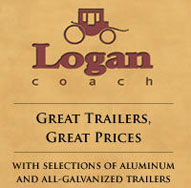 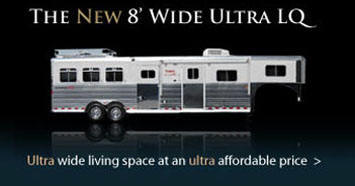
|
1/2 ton, 3/4 ton
or 1 ton?
Rear
Axles Explained
The size of the truck you need
depends of course on your needs. ½ tons and light duty ¾ tons
are for light duty work, loaded part-time. Heavy-duty ¾ tons, 1
tons and above are designed to be loaded all of the time. They
have twice as many tapered bearings in the rear axle. It’s
called a full floating axle, similar to semi-truck
eighteen-wheelers. While ½ ton pickups have a semi-floating axle
similar to a car, with just 2 bearings. ½ tons and light duty ¾
tons will have a flush axle housing matching the wheel. With the
heavy duty ¾ ton, 1 ton trucks and larger, the rear axle housing
will actually stick out past the wheel and have an additional 8
bolts on the end of the hub holding the axle into the wheel hub
with the axle "floating" between between the wheel hub and
differential. Rolls Royce invented the "full floating" axle
before WWII.
|
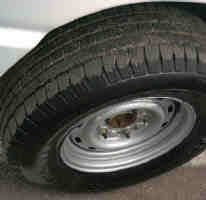 The
"Semi-floating axle" has the wheel studs attached to
it, carrying the trucks weight directly on the axle shaft and
bearings. Differently on a "full floating axle" where the axle
shafts only provide power to the wheel hub from the
differential. The wheel hub is attached to the axle housing with
two tapered bearings on each side. On a full floating axle you
can pull the axle out and the wheels are steel attached to
differential axle tubes. This puts the load carrying capacity on
the axle housing not on the axle shaft as with a semi-floating
axle. The
"Semi-floating axle" has the wheel studs attached to
it, carrying the trucks weight directly on the axle shaft and
bearings. Differently on a "full floating axle" where the axle
shafts only provide power to the wheel hub from the
differential. The wheel hub is attached to the axle housing with
two tapered bearings on each side. On a full floating axle you
can pull the axle out and the wheels are steel attached to
differential axle tubes. This puts the load carrying capacity on
the axle housing not on the axle shaft as with a semi-floating
axle. |
|
 This
Full floating axle provides a more even weight
distribution over the axle than a semi-floating axle. By
removing a rear axle hubcap, you can determine if the truck is a
½ ton, light duty, ¾ ton or a heavy-duty ¾ ton, 1 ton or bigger. This
Full floating axle provides a more even weight
distribution over the axle than a semi-floating axle. By
removing a rear axle hubcap, you can determine if the truck is a
½ ton, light duty, ¾ ton or a heavy-duty ¾ ton, 1 ton or bigger.
|
Long box or
short box?
If you are pulling a fifth wheel
trailer I recommend a long bed. Sometime in RV parks or corrals
you will need to "jack knife" your trailer. (Your truck and
trailer at 90 degrees.) Your trailer is generally attached to
your truck 5 inches in front of your rear axle. This gives you
steering weight and a level trailer. If you have a short box and
you "jack knife" your trailer may kiss your cab!. Full pieces of
plywood or sheet rock fit into a long box with the tailgate
closed. Short boxes are popular today with the mini- garages and
those famous drive-up windows. You can buy a sliding fifth-wheel
hitch for a short bed to allow you to move the hitch back for
those tight maneuvers. |
Duals or
Single Rear Wheels?
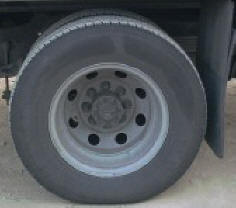 I
eventually went to duals, mostly because I pulled my trailers on
dirt roads. Dirt roads are hard on the magnets on the trailer
brakes. I soon discovered not to count on the trailer brakes.
And duals on the truck will surprise you on their ability to
stop you. On a factory dually the inside tire matches the front
tire. When the snow got deep I would take off the outside duals
and they would track fine. On a factory cab and chassis the rear
duals splits the front track. With duals you also need to carry
your hammer or bat just like the big boys to check the air
pressure more often. You won't be able to look a duals to see if
they are low unless you're loaded. So get in a habit of tapping
the tires before you roll. If you have a flat on one of the
duals they can loosen up the lug nuts. I
eventually went to duals, mostly because I pulled my trailers on
dirt roads. Dirt roads are hard on the magnets on the trailer
brakes. I soon discovered not to count on the trailer brakes.
And duals on the truck will surprise you on their ability to
stop you. On a factory dually the inside tire matches the front
tire. When the snow got deep I would take off the outside duals
and they would track fine. On a factory cab and chassis the rear
duals splits the front track. With duals you also need to carry
your hammer or bat just like the big boys to check the air
pressure more often. You won't be able to look a duals to see if
they are low unless you're loaded. So get in a habit of tapping
the tires before you roll. If you have a flat on one of the
duals they can loosen up the lug nuts. |
Limited slip differentials.
Generally in a limited slip rear end a clutch engages
when the right wheel, which is the driver, spin's, allowing both
wheels to give you traction. It's usually beneficial to have it
unless you are pulling heavy loads most of the time and on dirt
or mud wearing the clutch in the differential. |
|
The Best Tranny
Pans, Differential, and Valve Covers.
|
|
PML
knows how to keep you covered!
You hear me complaining about oil
capacity on this website constantly. Now I found a way
to add 2 or 3 more quarts of oil to your tranny and
differential. The more oil, the more cooling ability,
the longer your truck will stay out of the shop and on
the road! Pulling trailers builds extra heat in your
engine, transmission and axles. You need extra oil
capacity and a cover designed for cooling, not the
stamped flat pans and covers truck manufactures buy
100,000 at a time from the cheapest bidder. It's up to
you to give your truck the longest life.
Click for more.
|
|
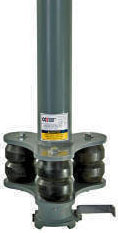 Cushion
Glide Coupler.
Want to stop the chain reaction from the rough ride
transferring from the truck to your trailer or from your
trailer to your truck?
Cushion Glide Coupler has a
solution for eliminating the metal to metal impact from your
gooseneck trailer. Reduce the stress and strain that have
your truck and trailer working against each other by
59%. It's easy to install,
adjust and 70% less cost than
the air bag hitches. And who wants that big air hitch in
your bed along with an air compressor. The three Timbren
Rubber Cushions have a lifetime warranty on this tested
performance gooseneck coupler.
More.... Cushion
Glide Coupler.
Want to stop the chain reaction from the rough ride
transferring from the truck to your trailer or from your
trailer to your truck?
Cushion Glide Coupler has a
solution for eliminating the metal to metal impact from your
gooseneck trailer. Reduce the stress and strain that have
your truck and trailer working against each other by
59%. It's easy to install,
adjust and 70% less cost than
the air bag hitches. And who wants that big air hitch in
your bed along with an air compressor. The three Timbren
Rubber Cushions have a lifetime warranty on this tested
performance gooseneck coupler.
More.... |
 Stop
tire cupping, vibration and premature wear on those
expensive truck, RV & trailer tires.
Centramatic
automatic wheel balancers have been saving money on tires
for semi-trucks for over twenty years. Now you can
automatically balance your tires, wheels, hub and rotors or
drums while you drive. A balanced tire doesn't cub, vibrates
less & lowers the tire sidewall temperature from less
flexing, giving you longer tire life. 5 year warranty, made
in the USA.
More Stop
tire cupping, vibration and premature wear on those
expensive truck, RV & trailer tires.
Centramatic
automatic wheel balancers have been saving money on tires
for semi-trucks for over twenty years. Now you can
automatically balance your tires, wheels, hub and rotors or
drums while you drive. A balanced tire doesn't cub, vibrates
less & lowers the tire sidewall temperature from less
flexing, giving you longer tire life. 5 year warranty, made
in the USA.
More |
|
Limited slip
differentials.
Generally in a limited slip rear
end a clutch engages when the right wheel, which is the driver,
spin's, allowing both wheels to give you traction. It's usually
beneficial to have it unless you are pulling heavy loads most of
the time and on dirt or mud wearing the clutch in the
differential.
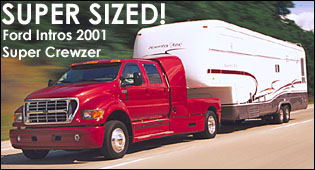 Always
read your owners manual about your particular trucks
weight limits, pulling limits, and gross vehicle weight
rating! Always
read your owners manual about your particular trucks
weight limits, pulling limits, and gross vehicle weight
rating!
Will it
fit my garage?
I get asked that a lot. It
seems the new homes are copying the large mall's with
sizing their parking spaces to the smallest car made. So
I considered it my duty to tell you how big a hole you
need. After all it's probably your largest payment after
your house! And I include the bumpers.
These measurements are on new
trucks. To see truck dimensions, total length, box
length and wheelbase,
click
|
|
Your Online
Pickup Truck,
SUV &
Trailer
Resource
Magazine.
|
The Truth about Auto
Loans.
Good credit
or not so Good credit, learn the inside secrets that make auto
dealers their biggest profit! Don't go unarmed and at their
mercy. Bring your own loan with you! Know your rate and payment
first. Now you can deal like you are buying with Cash!
Being a
Farmer/Rancher for Decades gave me a Natural Distrust of Banks.
I Love Giving them Competition,
Click
Here! 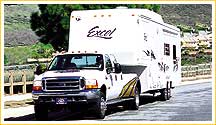
After you spent
the $40,000 on the Truck, Do You know if it will pull your
Trailer in the Mountains?
One stop truck
shopping, comparing, buying, and selling, new or used.
I highly recommend this great service.

|
Should I buy New or Used?
|
We have all heard that
when you buy new, you loose money as soon as you drive
it off the lot. I don't agree. Especially when it comes
to trucks. I've wore out trucks for over 2 decades and
sold them for 1 decade. Used vehicles drop in value just
as fast as new. You are going in both cases from retail
to wholesale as soon as you take it home.
For
a detailed report go to the bottom of page 3. |
Pickup Truck
Health Insurance, The Truth about Warranties!
We keep our trucks longer than
cars. So the miles had up over the years. To keep your overall
costs or cost per mile low, your Truck needs it's own health
insurance. 4x4's have twice the drive train, the expensive
stuff, to repair. Have the peace of mind that a Warranty gives
you! But don't buy it from the dealer unless they give you time
to read all the fine print and Compare our Prices.
Click here to find out how auto dealers make their highest
profit margins from warranties. Then take ours for a test drive
and save money! Lots of money!
|
Bragging rights,
I say Competition created American Free Enterprise.
|
For 3 of the 10
years I've sold trucks, I was an auto broker. Most of the time
working for AAA Auto Club, buying vehicles for the membership,
I've sold all the major makes and models. Most people become
loyal to one brand. But it's good to compare. Competition is
what improves things. The Japanese taught us valuable lessons in
the 80's on how to build cars. We as humans are such emotional
buyers. We seldom do what's best for us. And of course marketing
rules the earth. That's why the best diet in the world is
shutting off the TV! I know how much I've gained watching pizza
commercials. Back to trucks, competition helps us in so many
ways. The top brands usually alternate leadership with each new
model. But there is a difference in areas like diesels and
transmissions.
I remember my dad having a Massey Ferguson
model 92 combine. He thought that was the greatest thing since
sliced bread, and of course so did I. Then one summer I ran my
uncle's model 95 John Deere. I couldn't believe it. The engine
wasn't buried in the middle of the combine, it was on top where
you could actually check the oil and change spark plugs. And
another thing, the main belts weren't buried in the middle
either; they were on the outside of the combine, so you could
actually change them without learning the latest cuss words! I
saw combines evolve for the better and I've seen trucks evolve.
Driving an empty 4x4 three-quarter ton in the 70's meant seeing
the local chiropractor and dentist after being bounced like a
basketball! And now they drive like cars.
My first
driving experience was in dad's "53" Ford F-250. I became very
good at jackrabbit starts. That lesson came in handy later when
I drove our "47" two ton Chevy hauling hay. The jackrabbit
starts gave my brother Steve, a few tumbles off the hay truck. I
finally mastered "easing the clutch." I'm certainly glad that I
learned to drive in the country. I would hate to learn on I-25
in Denver!
My dad's only new pickup was a 1972 ¾ ton
GMC. "72" was the last year Ford or GM made a bed that was thick
enough for me. Back then you didn't need a bed liner. As my mind
wanders back in time I will update this article from fond
memories of the trucks in my life.
|
The
Best Quick-Attach
Mudflaps!
|
|
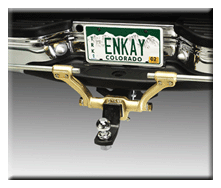 I've
used and abused a lot of mud flaps over the years,
Drilled a lot of holes in bumpers and fenders and
welded my share of angle iron on trucks, just to get
my mud flaps were they would do me some good. It's a
shame to have a nice trailer and then let your truck
tires sandblast it and the wiring harness. These
folks can solve that problem. And save fuel.
for more info
These are
cool mud flaps! [rock
tamers] Protect
your Trailer! I've
used and abused a lot of mud flaps over the years,
Drilled a lot of holes in bumpers and fenders and
welded my share of angle iron on trucks, just to get
my mud flaps were they would do me some good. It's a
shame to have a nice trailer and then let your truck
tires sandblast it and the wiring harness. These
folks can solve that problem. And save fuel.
for more info
These are
cool mud flaps! [rock
tamers] Protect
your Trailer!
|
 My Truck
and Trailer
Resource Page.
My Truck
and Trailer
Resource Page.
| Diesel
Ramblings:
What
upsets me is when engineers and developers have a great
product and then the corporation accountants get a hold
of it and slash part of the component of the engine
system to save money.
What has happened to the Ford/Navistar 6.0L is a crime.
I've driven and pulled with ones that are great and ones
with problems, but when Sturman Industries designed the
G2 injector for the 6.0L Power Stroke and the
International VT365, it was great. It had a pre-shot
(pilot injection) 2 compression shots and post shot like
the Dodge "600" has now. And then the accountants
started deleting components to lower the cost.
The
Ford 6.0L has EVRT turbo (variable vane) acting like a
small spool turbo and large turbo, worked great. I
interviewed the chief engineer for Ford about this EVRT
hydraulic activated turbo, 2 years ago and guess what?
Now he's the chief engineer at GM and the Duramax has
the EVRT hydraulic activated turbo in January on 2004.5
for more power. And this year (04) the accountants took
the pilot injection clear out of the 6.0L Power Stroke.
And it's still a good truck, but it could have really
been phenomenal.
I
like competition in diesel trucks and it's closer than
it has ever been, with GM and Ford improving their
diesels and Dodge improving it's body and
transmission. So they are all three very close. Dodge is
ahead in the power race, if they would get a 5-speed
auto and a real crew cab instead of the Quadcab, they
would sell as many as Ford. (They listened in 2006
Mega-Cab) Dodge just passed GM in numbers on diesels
after GM passed Dodge a couple of years ago with the
Duramax. But Ford, which has out sold Dodge and GM
diesels combined for over a decade is still #1 in sells
by a wide margin.
Now
hang on to your hats, Nissan and Toyota are working on
3/4-ton trucks with diesels. The 2005 VW Touareg SUV
will have a V-10 diesel. So if you think you need the
best truck every year, then get a 1 or 2-year lease and
keep switching brands. Freightliner's M2 has a class 5
truck like a Ford F550 or GM C5500 and Peterbilt may
have a class 5 version of the 330. GM's C4500/5500 will
offer 4x4 this summer and probably 2006 will see Dodge
with a cab and chassis again. (Scheduled for 2007) And
that's all I have to say about that.
From what I'm seeing,
the
new policy for Ford, "the loudest wheel gets the
grease." When the 6.0L PS first started having problems,
Ford was being good, buying back some trucks, fixing
some and handing out thousands of free oil changes. They
had Blue Diamond pull a trailer around the country from
dealer to dealer with engine cutouts and video display's
and tech folks onboard trying to explain the problems
and the fixes. I've got a lot of contacts at Ford and
have been handing out those ph #'s to my Insider Club
members with problems. Some have gotten help and some
are now suing Ford. Lately, the only thing working is
suing Ford.
The good news is warranty problems have slowed down
dramatically for the 2004 model PS, though Ford has
taken out the pilot injection and they are louder. 2003
has turned out to be a dramatic example of "first year
blues." The Ford 6.0L PS trucks I drove 2 years were
great and thought 03 would be a great year for Ford, but
that's the underlying risk of the first year of dramatic
change. On the other hand, Dodge in 03 changed the
diesel, transmission, frame, axles, transfer case,
suspension, steering etc. and that many changes meant
real danger in the first year blues, but they came out a
champion with few problems. 03 was a surprising year.
But as Kay says, just when you think you know something,
someone will show you how stupid you are. Sometime I'm
going to get real stupid and list my top picks for each
truck class for 2004 and see how they did next year. (04
Ford Power Stroke recall to be issued in July 06)
Low sulfur diesel fuel will be coming soon for the
tighter emission standards. 2007 is when it gets strict.
The Ford Power Stroke and GM Duramax have Exhaust Gas
Recirculated (EGR) and catalytic converters to meet the
2004 new emission standard and Dodge added catalytic
converters and no EGR to meet the 2004 emissions. By the
end of this decade we'll probably see the same emission
standards for gas and diesel engines.
I've updated the time it takes to pay for a diesel
engine option with fuel savings from 80,000 miles to
100,000 miles. It's easy to get addicted to the power of
a diesel. And the competition with diesel trucks has
dramatically improved since 2001. VW's SUV the Touareg
will have a V-10 diesel again. The new
Dodge/Freightliner Sprinter vans with Mercedes
have 5-cylinder diesels and 5-speed automatics that are
getting over 20 mpg in a full size van. I'm going to
review one of them this spring.
So diesel development is getting faster and faster. Also
this spring I'll be driving a "camless diesel" in an
International semi truck DT466 from Sturman Industries.
Bosch is also working on a camless diesel. So maybe this
decade, Navistar and Cummins will have diesel engines
with no, cams, push rods, timing chains, lifters and
have engine brakes in pickup truck diesels. Start saving
money, you'll want to buy a new truck every year just to
have the latest technology. George Jetson would be proud
A
used diesel not maintained properly and over pulled
beyond it's factory weight ratings can be an expensive
time bomb. Diesel mechanics charge more that gas engine
mechanics per hour, engines, radiators, alternators,
starters, batteries etc. all cost more in relation to
diesel engines. If a diesel truck wasn't serviced
properly with the more expensive than gas, filters, and
cooling fluid additives etc. and if the truck pulled
trailers way beyond the GCWR limits, which is common,
then buying a 100,000 mile diesel truck may cost you a
fortune or could last another 100,000 miles. But a used
diesel truck with a pedigree from a one owner pulling
moderate trailer weights and service receipts is worth a
premium. Some people use the high setting on chips and
micro turners which works them hard to have most of the
goody used up. That's how most of my trucks were when I
was done, I stripped them down to the frame and sold
them by the pound.
So when I relate to it taking around
100,000 miles for a diesel engine to pay for itself with
fuel savings, I'm calculating how long it takes to pay
for the extra $4000 for the diesel option and the extra
cost of servicing, since I can't predict accurately
future resale value, I can't add that back in. Five
years from now Arnold could have the EPA ban all new
diesels in California, or hydrogen cell technology could
make the hybrids, take over the market. Or maybe I could
go back to decaf. I love diesels too buy I also look at
"the bigger picture." That's the name of my column in
the Turbo Diesel Register magazine out in February were
you can learn about camless diesels that idle on 3
cylinders and can go from a 2-stroke to a 8-stroke with
almost 0 emissions.
My point is diesels don't save you dramatically over a
gas engine as they once did. The underlying reason folks
buy diesels is power. The diesel side of the debate gets
championed more than the gas side. I like to show more
than one viewpoint. If you tow heavy trailers the
majority of the time, the diesel makes sense as with
over-the-road semi-trucks. But the majority of truck
owners now use their trucks as a car and pull trailers
less then 25% of it's life. Sometimes I get email from
folks telling me how shocked they were at their first
oil change cost of $75 to $100 for their diesel. Back
when our choices in the late eighties where the new
Dodge Cummins diesel in 89 or a just fuel injected Ford
460 or GM 454, then diesels could get twice the fuel
mileage of a gas engine. Now we have gas engines that
without a load can get 14-16 mpg verses a diesel 17-19
mpg highway miles and loaded pulling a trailer at 10-11
verses a diesel at 14-16 mpg. Bottom line, not everyone
who pulls a trailer would save money with the diesel
option. My mission is showing the strengths of the
minority view.
Yes indeed, diesels use very little fuel at idle
allowing truckers to keep the truck running while they
nap. And the carbon buildup in a idling gas engine is
not conducive to long life. But the soot in a diesel
engine will also build up harmfully if you shut of a
diesel that has idled long only. In Europe diesel
passenger cars make up over 40% of the vehicles verses
our less than 1%. In Spain you can buy a Ford Focus
diesel. In this country with VW offering an economical
diesel car for a couple of years now but not in all
states, as well as in 2005 they will have a 5.0L V-10
diesel avail bile in the SUV Touareg. Mercedes will
start offering diesel 05' C class this fall again.
Europe is on the path that diesels are the future to
economy and lowered air pollution, while politics in
this country are toward, alternative fuel, and hydrogen
cells. Actually the engineers I interview think it's
impossible to make the hydrogen cell save enough. VW has
a major project underway with biodiesel, biomass called
SunFuel, which will complete the circle with only C02
emissions going back to the plants that to produce more
boimass. I not against diesels, I just don’t think they
fit every scenario nor do I think everyone needs a
dually to pull a horse trailer.
|
This is One
Interesting and Informative All-Around Website! P.S. Thanks for
Posting my Truck. Scott H, Henderson, NV USA
Interesting, informative stuff good job, Peter A, USA
|
Truck, SUV and
Trailer terminology for loads and towing.
Check back as this list will
grow
|
| When towing live
cargo such as horses with their high center of gravity,
swatting flies with their tails, it is advisable to not
tow at the maximum trailer capacity.
Base Curb Weight: the
empty weight of a vehicle including all standard
equipment, 150# driver and a full tank of fuel.
Does not include cargo, options or passengers.
Base Curb Weight plus
Cargo Weight plus Passenger Weight equals Gross Vehicle
Weight.
Cargo Weight:
includes all weight added to the Base Curb Weight. When
towing , trailer tongue weight is included in Cargo
Weight.
Payload: the
combined maximum allowable weight of cargo and
passengers that the truck is designed to carry.
Gross Vehicle Weight
Rating minus the Curb Weight equals Payload.
GVW: Gross
Vehicle Weight - the actual loaded weight of your
vehicle, the Base Curb Weight plus actual Cargo Weight
plus passengers.
Gross Vehicle Weight
plus Loaded Trailer Weight equals Gross Combination
Weight, GCW must not exceed GCWR.
GVWR: Gross
Vehicle Weight Rating - the maximum allowable weight of
the fully-loaded vehicle with axles (including
passengers and cargo).
The GVW must never
exceed the GVWR.
GAW: Gross Axle
Weight- the total weight placed on each axle, (front and
rear.) The easiest way to get this number is to drive
just the front axle of the loaded truck with the loaded
trailer on a scales and then drive the all the loaded
truck's tires on the scale with the loaded trailer still
connected but not on the scale. Subtract the front axle
weight from the total loaded truck weight and you have
the rear axle weight.
GAWR: Gross Axle
Weight Rating- the maximum weight to be carried by a
single axle, (front or rear.)
The total load of each
axle must never exceed its GAWR.
GCW: Gross
Combination Weight- the weight of the loaded vehicle,
(GVW) plus the weight of the fully loaded trailer.
GCWR: Gross
Combination Weight Rating- the maximum allowable weight
of the towing vehicle and the loaded trailer, including
all cargo and passengers.
The Gross Combination
Weight must never exceed the GCWR.
GTW: Gross
Trailer Weight - the actual total weight of the
loaded trailer. Trailer- Gross Vehicle Weight not
to exceed the GVWR of the trailer.
TW: Tongue
Weight - refers to the amount of the trailer's weight
that presses down on the trailer hitch, whether a bed
mount hitch, (mini- fifthwheel or ball) or a receiver
hitch attached at the rear of the truck.
WDH: Weight
distributing hitch
Trailer and
Receiver Hitches Classes and Types. Mounted to the
trucks frame.
Class I-Light Duty:
2000#'s maximum trailer weight. 200# tongue weight,
300 #'s with weight distributing hitch.
Class II- Medium
Duty: 3500#'s maximum trailer weight. 300# tongue
weight, 500#'s with weight distributing hitch.
Class III- Heavy
Duty: 5000#'s maximum trailer weight. 7500#'s
trailer weight with a weight distributing hitch. 300 -
500# tongue weight. Up to 750# tongue weight with weight
distributing hitch.
Class
IV-Extra-Heavy-Duty: 10,000 to 12,000#'s and above
maximum trailer weight depending on the manufacture.
1,000# tongue weight with a weight distributing hitch.
Class V receiver hitch can be over 12,000#'s.
Caution: Always
read the label on the hitch including factory equipped
receivers. Some hitches are rated their maximum capacity
only if you use a Weight Distribution Hitch.
Trailer brakes and
cab controls are needed on trailers weighing over
1500#'s. Surge brakes used commonly on boats will not
have a manual control in the cab, but rely on the
movement of the tow vehicle to activate the trailer
brakes.
Receiver Hitch

Weight Carrying Hitch
or Drawbar: All the Tongue Weight of the
trailer is carried by the hitch.
Weight Carrying Hitch or Draw Bar or Stinger or Ball
Mount

Weight Distributing
Hitch: Most of the trailer's Tongue Weight is
transferred to the tow vehicle's frame (through the
hitch receiver). Total load is distributed to all the
axles of the truck and trailer. For
more info on WDH, click
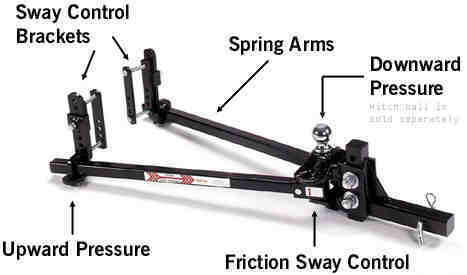
With
gooseneck trailers, tall modern trucks don't
always allow you much clearance between the bedrail and
gooseneck floor. Eight inches is usually good clearance
considering dips and potholes.
|
Truck & SUV Reviews
& News. Matching Trucks &
Trailers
|

|
Your Online
Pickup Truck,
SUV &
Trailer
Resource
Magazine.
|
|
HOME
TOP 1]
[2]
[3]
[4]
NEXT
©
Copyright 1999-2011 by
H. Kent Sundling
|
|
|
|
Now
here is my disclaimer: I drove a tractor in a circle summer
fallowing for a couple of decades, so as I told the folks in
Denver when I moved here 10 years ago, if you think I can spell
or remember the grammar I learned in high school, you'd be
incorrect. I don't know everything and can make mistakes. Just
like listening to the preacher on Sunday, you better follow
along in the Bible to be sure. Sorry for any mistakes they were
not intentional.
� Copyright 1999 H. Kent Sundling
and MrTruck.net. All rights reserved including digital rights.
The web site dedicated to saving you time and money on the most
complicated consumer product built.
|
|
|











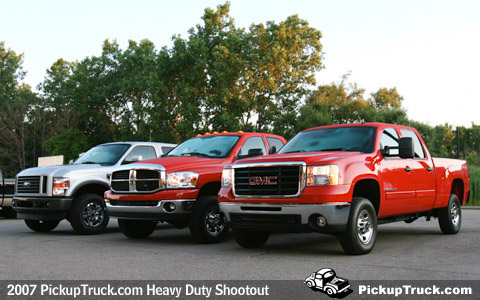

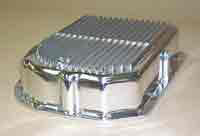
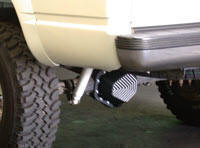
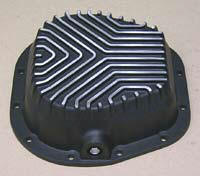
 Cushion
Glide Coupler.
Want to stop the chain reaction from the rough ride
transferring from the truck to your trailer or from your
trailer to your truck?
Cushion Glide Coupler has a
solution for eliminating the metal to metal impact from your
gooseneck trailer. Reduce the stress and strain that have
your truck and trailer working against each other by
59%. It's easy to install,
adjust and 70% less cost than
the air bag hitches. And who wants that big air hitch in
your bed along with an air compressor. The three Timbren
Rubber Cushions have a lifetime warranty on this tested
performance gooseneck coupler.
Cushion
Glide Coupler.
Want to stop the chain reaction from the rough ride
transferring from the truck to your trailer or from your
trailer to your truck?
Cushion Glide Coupler has a
solution for eliminating the metal to metal impact from your
gooseneck trailer. Reduce the stress and strain that have
your truck and trailer working against each other by
59%. It's easy to install,
adjust and 70% less cost than
the air bag hitches. And who wants that big air hitch in
your bed along with an air compressor. The three Timbren
Rubber Cushions have a lifetime warranty on this tested
performance gooseneck coupler.






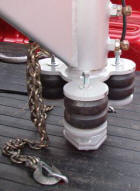

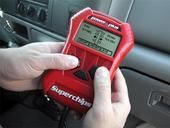
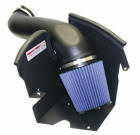

 I've
used and abused a lot of mud flaps over the years,
Drilled a lot of holes in bumpers and fenders and
welded my share of angle iron on trucks, just to get
my mud flaps were they would do me some good. It's a
shame to have a nice trailer and then let your truck
tires sandblast it and the wiring harness. These
folks can solve that problem. And save fuel.
I've
used and abused a lot of mud flaps over the years,
Drilled a lot of holes in bumpers and fenders and
welded my share of angle iron on trucks, just to get
my mud flaps were they would do me some good. It's a
shame to have a nice trailer and then let your truck
tires sandblast it and the wiring harness. These
folks can solve that problem. And save fuel.





